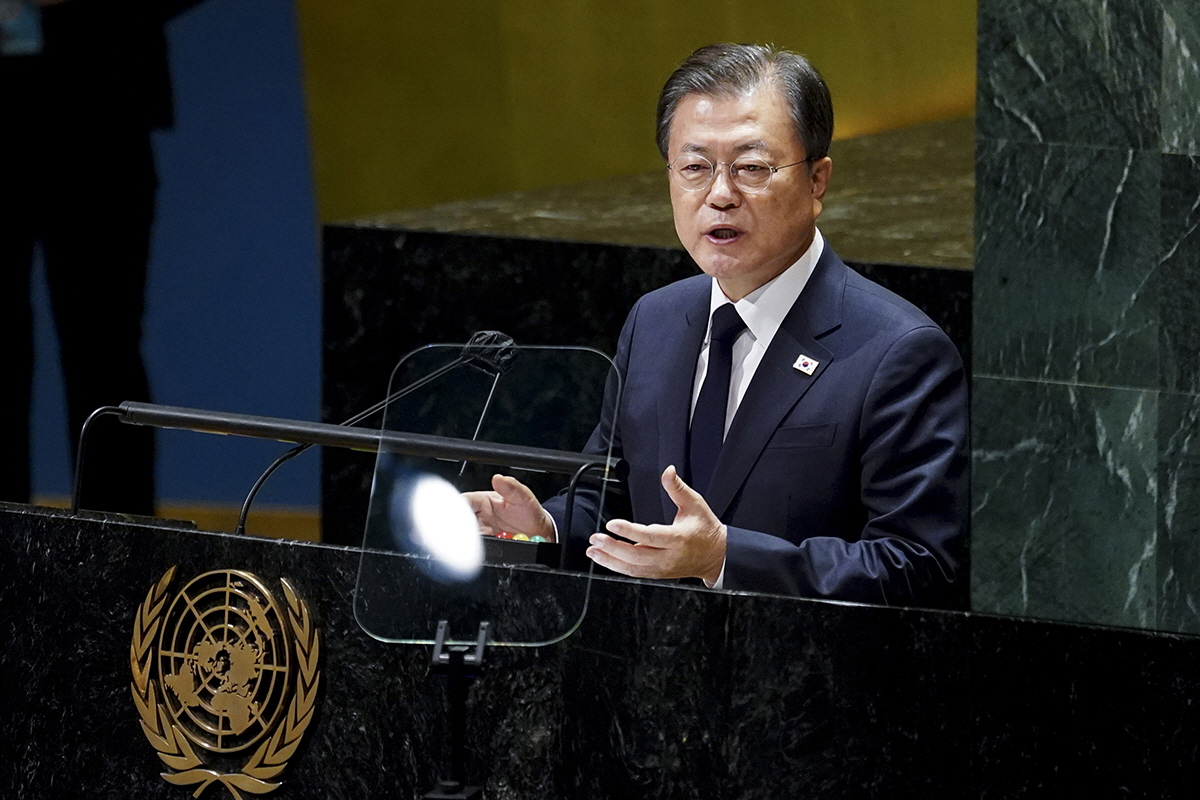[Oct] President calls for solidarity in ‘global community’
Date Sep 30, 2021
 President Moon Jae-in delivers a speech at the 76th session of the United Nations General Assembly in New York, Sept. 21 (EST). Courtesy of Cheong Wa Dae
President Moon Jae-in delivers a speech at the 76th session of the United Nations General Assembly in New York, Sept. 21 (EST). Courtesy of Cheong Wa Dae
The COVID-19 pandemic has reminded the world that international cooperation is key to overcoming the challenges facing humanity and ushering in “an era of global community,” President Moon Jae-in said in a keynote speech at the United Nations.
Speaking at the 76th session of the United Nations General Assembly in New York, September 21, President Moon recognized the U.N.’s role and pledged Korea’s active participation in an international order of solidarity and cooperation to be led by the global body.
The President noted that humankind has overcome numerous infectious diseases by putting their minds together and helping each other, which he said would also work to end the coronavirus pandemic.
“In our fight against coronavirus, borders were crossed to share genomic information; vaccines were successfully launched through close collaboration; and therapeutics are also being developed at a rapid pace,” President Moon said. “The horizons of our lives and thoughts have extended from villages to countries, and from countries to the entire planet. This, I believe, is the coming of an era of global community.”
In the era of the global community, all countries need to pursue sustainable development with their “best possible goals and best possible approaches,” and the U.N. will play a larger role in that cooperation, President Moon said.
“Now the U.N. is requested to recommend a new set of rules and goals as it ushers in this era of global community. To facilitate mutually beneficial cooperation within the framework of multilateral order, the U.N. must become an institution that builds trust among nations.”
President Moon said Korea will actively participate in such U.N.-led efforts.
He added that global tasks include not only the fair distribution of coronavirus vaccines, but also emerging together from the COVID-19 crisis. The President also noted the importance of an international response to the climate crisis, highlighting Korea’s efforts such as legislating the Framework Act on Carbon Neutrality, the closures of coal-fired power plants earlier than scheduled, and ceasing public financing for new coal-fired power generation projects overseas.
In line with the security and peaceful coexistence of the global community, President Moon called for a declaration to formally end the Korean War. The two Koreas are still technically at war since the conflict was halted by an armistice and never officially ended by a peace treaty.
President Moon proposed that the declaration be made by three parties, including the two Koreas and the U.S., or four parties, including the two Koreas, the U.S. and China.
“When the parties involved in the Korean War stand together and proclaim an end to the war, I believe we can make irreversible progress in denuclearization and usher in an era of complete peace,” President Moon said.
Noting that this year marks the 30th anniversary of the simultaneous admission of South and North Korea into the U.N., he said, “When the two Koreas and the surrounding nations work together, peace will be firmly established on the Korean Peninsula and prosperity fostered across all of Northeast Asia. That will go down as a ‘Korean Peninsula Model’ in which peace is attained through cooperation.”
**If you have any questions about this article, feel free to contact us at kocis@korea.kr.**

The Ministry of Culture, Sports and Tourism's "Korea Here & Now" work can be used under the condition of "Public Nuri Type 1 (Source Indication)."




